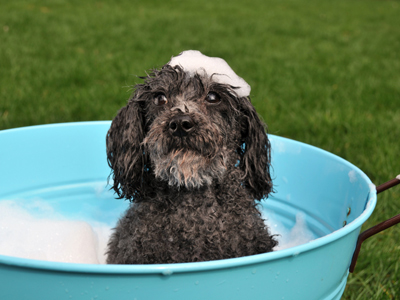
Can You Do It? - Modal Auxiliary Verbs
Quiz playing is a wonderful way to increase your knowledge of English as a Second Language. Remember that all of our ESL quizzes have titles that are both friendly and technical at the same time… In the case of this quiz you might like to tell your friends about the “Can You Do It Quiz” but no doubt your teachers will talk about “Modal Auxiliary Verbs”. If you hear a technical term and you want to find a quiz about the subject then just look through the list of quiz titles until you find what you need.
This Quiz gives you more practice at making questions with what is known in English as modal auxiliary verbs ('can', 'must', 'may' etc.). Give the questions below a try and keep trying until you feel comfortable with the subject. Even if you don't always remember what modal auxiliary verbs are you can nonetheless get good at using them!
' ... we come in front of you in the queue, please, as we have a sick child with us?'
If you would like someone to stop doing something that disturbs you, you can say:
'How ... ... you just sit there eating, when children are hungry tonight on the streets of our city?'
An even more pointed way to ask this sort of question is 'How COULD you ... ?', perhaps with the rest of the question unspoken, maybe because it's obvious what's wrong: e.g. someone borrowed a precious piece of clothing from you ... and came back from a party after being sick, or dropping dark-coloured food or drink, all down the front of it.)
This is a rather dramatic form, like you might see on a TV or film or computer screen. It's very useful but very powerful; we recommend you don't use it yourself, unless (or until) you are very confident of the circumstances.
' ... you take me to King's Cross in time for a train at twenty past three, please?'
'What ... ... I do to stop all these sales calls coming in on the telephone?'
' ... you e-mail me when you get home? I'd like to stay in contact.'
'Why ... ... they always start digging holes in the road, just when we want to go away on holiday?'
' ... we offer you a complimentary drink while you are waiting to see Dr Jones?'
'May we ... ?' is polite, and offers you the chance to refuse ~ also politely : 'Thank you very much, but no, I'm not thirsty at the moment'.
'Might we ... ?' (Answer 3) is less direct; 'Can we .. ?' (Answer 4) is slightly silly, because it really means 'Are we able to?' ~ and they should already know whether they have any drink to offer you, before they start saying anything! (If you said 'Yes please' and they hadn't got any drink, and therefore couldn't serve you, that would be an embarrassing situation ... )
'Where ... ... he have put the washing-powder?'
For even more emphasis we could say 'Where CAN (such-&-such a thing) have got to?'.
Or, more mildly, 'Where might it have gone?' or 'Where could it have gone?'
We know of an old lady who, if ever she lost something ~ or just forgot where she had put it herself ~ used to challenge everyone else in the house: 'What have you done with my ... (scissors, or whatever) ?'!
' ... you see the tower yet?'
Ready for more?
not all...
quizzers. Try to win a coveted spot on our Hall of Fame Page.








Good manners are probably fairly similar all over the world, even if they vary in detail from place to place.
A famous bishop of Winchester, back in the 14th century, had as his motto: 'Manners Makyth Man'! ~ or, as we might loosely say today, 'Human civilisation wouldn't start or stay, unless people treat one another decently'.